Explore all the articles of the series The City’s Best Houses Open to the Public.
We need physical spaces for debate in our cities. Our reliance on social media has left our discussions and differences in the hands of powerful tech companies. In that space, we deliver messages to an audience of strangers and instruct others based on our own morals. Meanwhile, tech companies decide where to place our messages to best monetize people’s attention. They are not arbiters of truth, nor are they equipped to create a shared narrative around specific issues.
Consequently, the debate often devolves into a cascade of disheartening comments, lacking genuine reciprocal conversation. And so, both right and left fail to share a collective reality—a common starting point for discussion. People have always disagreed on how to approach various realities. Now they even dispute the facts.
As the dangers of separatism grow more pronounced, cultural institutions fulfil the role of an impartial voice to spark constructive conversation. In our series, we explore cities in search of historic houses whose owners brought people together not to espouse a single set of opinions, but to engage in meaningful discussions about the challenges of their time—discussions that help nurture democracy. These houses are heritage or cultural properties that aren’t strictly museums — they serve as living spaces for culture and events open to everyone. The legacy of their owners has often been passed to foundations or cultural institutions that balance preservation with community engagement and open debate through events.
This series is intentional. We aim to reach as many people as possible and convey the message that everyone is welcome to step into these houses and share their ideas, thereby making democratic debate possible once again.


